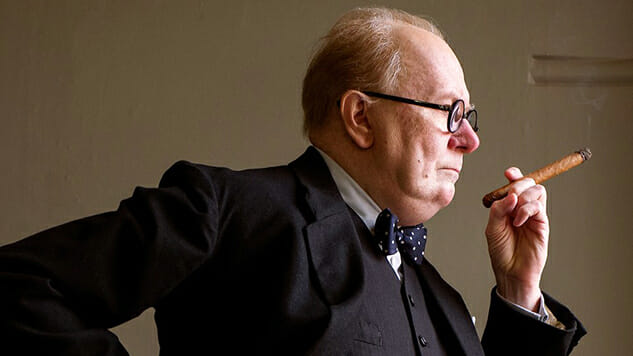
Darkest Hour is a film of flummoxed old white men hollering at each other, a perfect foil to (and double-bill alongside) Christopher Nolan’s Dunkirk, both because the two take place at about the same time during the early years of World War II—as Hitler’s world domination began to take shape and an invasion of the UK imminent—and because they are entirely different experiences: Dunkirk is all action, while Joe Wright’s film is all words. And with volume, those words gain weight—sound, in all of its ephemera and exigencies, is just as important to Darkest Hour as it is to Nolan’s visceral spectacle, except Wright’s are the sounds of bureaucracy and urbanity building to a fever pitch, and Nolan’s are the sounds of bodies in motion through time. Rarely has the uncomfortable, marrow-deep scritch of pen to paper bore such portent, except for maybe in Wright’s other period drama, Atonement.
Words, both written and wrung from his guts, constituted much of Winston Churchill’s (Gary Oldman) power, and Wright, guided by Anthony McCarten’s (The Theory of Everything) brisk-but-mannered script, seems fascinated with how that power manifested when Churchill relied on it most. Taking place over the course of a month (May 1940), from the ouster of a sick and unpopular Neville Chamberlain (Ronald Pickup) as Prime Minister to the dissolution of peace talks and Churchill’s “We Shall Fight On the Beaches” speech to the House of Commons on June 4, 1940, Darkest Hour reminds the audience, as its characters so often do, of Churchill’s prodigious oratorial talents.
The film also reminds most audiences, Americans especially, of the weirdly specific art of warcraft in Europe during the first half of last century, whether one’s morality precludes one from even considering that point or not, because, for many watching Wright’s film, the drama in the UK in 1940 seems almost too movie-friendly to be worth believing, and, given the current state of political discourse, championing such a warhawk mentality via historic icon like Churchill tows a weird line. Knowing what we know now about Hitler and the war, it makes sense that Churchill would assume any potential peace talks—in this case, as in reality, spurred by second-in-line-choice-for-PM Viscount Halifax (Stephen Dillane)—would be futile, but the way Wright portrays Halifax and cohort Chamberlain as villainous rivals counters the obvious fact that they were, among plenty of political ambitions, just trying to not get soldiers killed.
And yet, above all, Darkest Hour is a populist film, Wright’s most contrived scene a made-up convo between Churchill and a bunch of regular ole blokes on the Underground. Wright’s possible intent gains strength in retrospect: Churchill was inspired by the people he represented, but the people he represented were in a sense removed from the horrors of war. Shouldn’t politicians like Halifax and Chamberlain represent their constituencies by attempting to reduce losses as much as possible? When Churchill demands that the army at Caille basically allow themselves to be wiped out in order to protect the larger forces at Dunkirk, Wright gives Churchill not his first moments of piety, but a fiery bitterness toward being opposed, perhaps judging Churchill for doubling down on his choice to sacrifice a whole swath of his men. Talks of peace talks proceed similarly, in which Churchill utters one of the year’s most cinematic, room-silencing lines: “Will you stop interrupting me when I’m interrupting you!?”
Silence erupts from the din of war—in that ebb and flow of Darkest Hour, Oldman’s performance is formidable. Not only is his makeup beyond convincing (and undoubtedly Oscar-worthy), but Oldman understands that the bluster of what’s required of him to overcome the silliness of both his casting and facade must be balanced—countered and, all puns intended, fleshed out—in quiet. The film’s two most striking moments occur in silence: When Churchill allows his secretary (Lily James, impressively reserved) a moment with him to soundlessly ponder her brother’s death at Caille, and when, first addressing the nation on May 19th to tell white lies about the state of the British army and Hitler’s advance, Churchill’s silence is a palpable thing, felt until he breaks it with the onslaught of war propagandism, which Wright only stylizes via an aerial shot of a French battlefield landscape bombed to smithereens transitioning seamlessly into the landscape of a young corpse’s face, Bruno Delbonnel’s camera lingering on a vacant, clouded-over eye.
Wright often pulls out to these aerial shots, relieving the audience of the claustrophobia of war bunkers and overly-festooned rooms and smoky halls full of flummoxed old white men with a God’s Eye perspective. This push-and-pull, between loud and quiet, between intimacy and vastness, deepens what could otherwise end up a mealy-mouthed glimpse at a moment too engorged on its own laudatory memorializing. Which is why Darkest Hour transcends its biopic trappings to work, almost despite itself. It’s a beautiful thing, Wright’s film, an act of historical tension made with the grandest of ambitions tempered by the most careful of portrayals—precise in its bloat and fearless in its fantasy—a reminder today of what makes for actual leadership in a world exhausted by flummoxed white men with sound and fury, signifying nothing.
Director: Joe Wright
Writer: Anthony McCarten
Starring: Gary Oldman, Lily James, Stephen Dillane, Ronald Pickup, Ben Mendelsohn, Kristin Scott Thomas
Release Date: December 22, 2017 (wide)
Dom Sinacola is Associate Movies Editor at Paste and a Portland-based writer. You can follow him on Twitter.